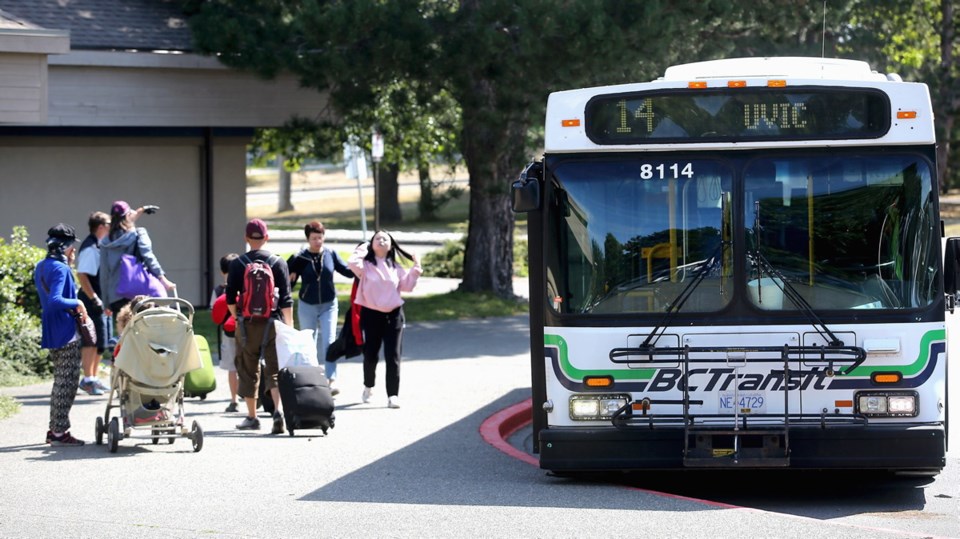For the second time in less than a year, the Victoria Regional Transit Commission has rejected the idea of exploring fare-free transit for youth as a way to encourage life-long riders, reduce traffic congestion and fight climate change.
Victoria Mayor Lisa Helps and Coun. Sharmarke Dubow, who sit on the commission, wanted transit staff to find other funding partners and develop a business case, with the idea of launching a pilot project in the 2021-2022 budget year.
But, as happened last August, the motion failed on a 4-4 tie Tuesday.
The commission members in opposition argued that expanding transit’s reach, convenience and reliability will do more to encourage ridership and fight climate change than eliminating youth fares.
“Let’s get the service that we think we can deliver,” Saanich Mayor Fred Haynes said.
“Let’s go to a carbon-free service delivery, as much as we can given our current constraints.
“And eventually, one day, let’s have free transit, but that’s not today.”
Haynes and others said that offering free fares will eat into money needed to buy more buses and increase the number of routes, particularly in Sooke and the rapidly growing areas of the West Shore.
“I’m struggling with how do I get both,” said Colwood Mayor Rob Martin. “How do I increase bus service and provide a free service and control costs at the same time?”
Sooke Mayor Maja Tait objected as well to proponents of fare-free transit arguing that it will help fight inequality.
“There is no equality for youth in our community,” she said. “They don’t have a bus at all.”
Helps said she agreed with Tait and Martin on the need for more transit options in Sooke and on the West Shore. But she said it shouldn’t be an either-or proposition in the context of a worsening climate crisis.
“I think either-or is the wrong argument to make,” she said. “I do think we need better transit in Sooke. I do think we need better transit in the West Shore and from the West Shore to downtown.
“What I wanted today was information on what all of that will take.”
In the end, Haynes, Tait, Martin and Saanich Coun. Susan Brice, who chairs the commission, voted against the motion. Helps, Dubow, Oak Bay Mayor Kevin Murdoch and North Saanich Mayor Geoff Orr voted in favour.
Helps said it was disappointing to see the commission defeat the motion without even exploring its options.
“It wasn’t that everyone was going to get a free bus pass tomorrow,” she said. “It’s like: ‘Take a preliminary step, develop a business case.’
“What would it cost? We don’t even know. How many buses would we need? We don’t even know.
“So I feel like the door was closed a little bit prematurely today.”
Emma-Jane Burian, a 17-year-old Grade 12 student from View Royal, echoed Helps’ concerns.
“The mayor of Sooke and the mayor of Colwood both spoke very eloquently about how transit to the West Shore is just not working,” she said. “And I totally agree with that. I experience that every day living in the West Shore.”
But she said political leaders need to be investing in better transit as well as making it more accessible.
“I think there could be a business case to do both — to expand our fleet, to make sure we’re accessing rural western communities, but also providing access for youth,” she said.
“It just will take money, but I believe that it’s important that we invest in our futures.”
Faced with another defeat at the commission, Helps said Victoria will continue with its own free youth bus pass program, which launched in December.
City figures show that 2,433 youth picked up passes in January, up from 2,130 in December.
The program is costing the city about $81,000 a month, with the money coming from new Sunday parking fees and general revenue.
In order to get the cheapest rate of $11.25 per pass, the city had to buy enough passes for all 7,200 youth in the city, whether they use the passes or not.
City officials expect the participation rate will jump next fall, when they hope to have a program in place whereby young people will be able to use their student identification cards as bus passes, the way college and university students do.



